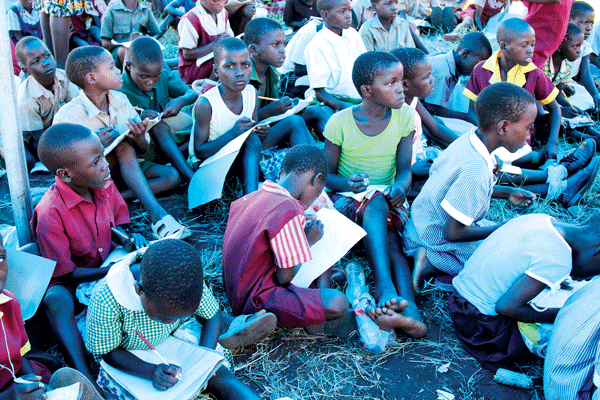
“In ward One, Chapoto Primary School is not easily accessible for the few Doma children coming from Mariga village.”
FOR the Doma children and people of Mbire, a district tucked away at the edges of Zimbabwe in Mashonaland Central province, hundreds of kilometres from the centre of government power and privilege, life is a daily nightmare.
BY TAPIWA ZIVIRA
Detached from the rest of the world due to a poor road and communications network, and located on the south bank of the Zambezi River at the extreme northern point of the country, and surrounded by safari areas, the district and its people endure some of the most difficult living conditions, according to a recent baseline survey conducted by the Centre for Community Development Zimbabwe jointly with the Open Society Initiative for Southern Africa (OSISA).
The survey, titled Promoting Access to Education for Children in Marginalised Communities in Zimbabwe and conducted in two wards in the district, concludes that the Doma people, who are “marginalised hunter-gatherers and nomadic people, do not consider education as a top priority given their way of life, which is characterised by a pursuit of food security as the most urgent and pressing need.”
In addition to being affected by the unavailability of food, some of the children are failing to attend schools during the rainy season when the Mwazamtanda River fills up, fueling drop outs, which, according to the survey are so prevalent that an official at Mbire Rural District Council interviewed during the survey, stated that at primary school level, less than five Doma children complete Grade Seven annually.
But their woes are not limited to that.
“In ward One, Chapoto Primary School is not easily accessible for the few Doma children coming from Mariga village.
- Chamisa under fire over US$120K donation
- Mavhunga puts DeMbare into Chibuku quarterfinals
- Pension funds bet on Cabora Bassa oilfields
- Councils defy govt fire tender directive
Keep Reading
This is due to the long distance that needs to be travelled through the thick Nyasogo forests, as well as the fact that the forests are infested with dangerous wild animals such as lions, leopards, elephants, buffalos, hyenas and other wild animals,” the survey reads.
For the adults, the major preoccupation is the search for food and work in the field, in exchange of grain, for the Chikunda people, who are over 15km away.
Other factors identified by the survey include, hunger, lack of proper clothing and uniforms for children, which hinder those who attempt to attend school.
The survey come at time when a 2013 education infrastructure audit exercise established that the country had a deficit of 2 056 schools, a requirement that government is unlikely to achieve in the near future as it is failing to meet basic obligations like paying civil servants on time.
In addition, the Zanu PF-led administration’s failure to stimulate the economy has resulted in government’s major preoccupation being to seek revenue to fund the civil service salaries at the expense of districts like Mbire that need infrastructure for health and education services, roads and other developments.
For the Doma people, isolated and far from the lights of Harare where ministers plan and execute national decisions, they have no idea of the nature of the crisis that have left them in the dark edges of the country and living in abject poverty.
Without access to any communication or media, allegations of looting, misappropriation of State’s resources, government policy inconsistencies, unnecessary political bickering and economic mismanagement, among a litany of reasons proffered for the poverty levels in Zimbabwe, are far from the Doma people’s earshot, leaving them to endure their nightmare of looking for the next meal.











